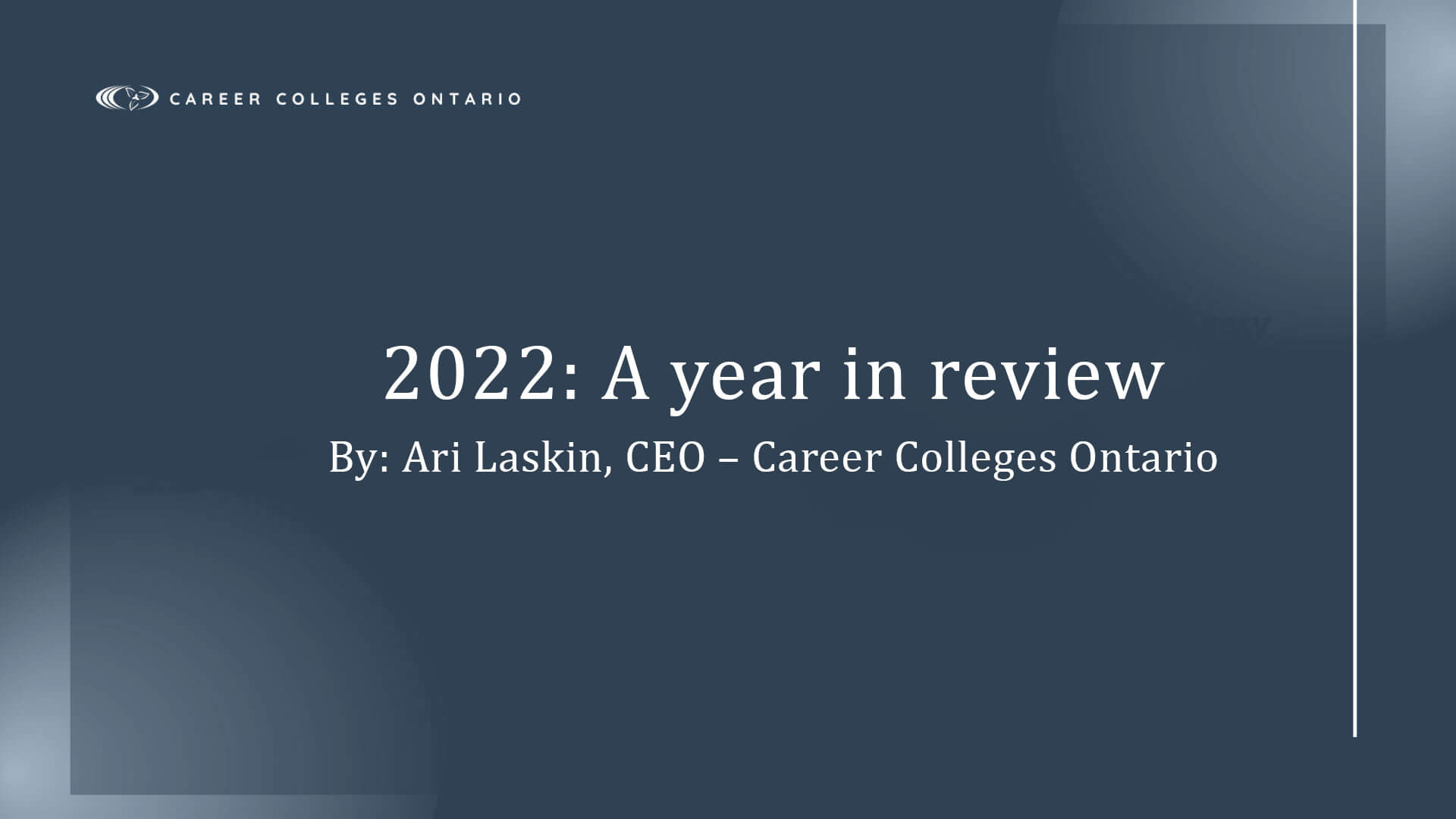
2022: A year in review
By: Ari Laskin, CEO – Career Colleges Ontario
When I was asked to write a reflective post on what the Association and the sector have accomplished over the past year, my mind turned to that famous Rent theme song, Seasons of Love, and the underlying question within it: How do you measure a year? We don’t measure our achievements in daylight, sunsets, or cups of coffee, though I know all of those would be high numbers at the very least. Rather, we can look at other metrics to evaluate our successes over the past year.
2022 marked a change in attitude in Ontario life. We began to shift away from a ‘locked-down’ society to one that was learning to live with the impacts and realities of COVID-19. We looked at 2022 as a beacon of light after a very dark two years prior. In many respects, 2022 did not disappoint. For the first time, regulated career colleges were front and centre in building up the workforce. We were front and centre in adding to the ranks of health human resource professionals, and we were at the cutting edge of reskilling and upskilling Ontario’s labour force.
We ruffled a few feathers along the way. We made sure that the government and the public knew where most of Ontario’s Personal Support Workers (PSWs) were trained: career colleges. We highlighted the agility and nimbleness with which we can pivot from full online learning to hybrid, and back to a return to the classroom, with ease. We made sure that decision makers and the public alike knew that regulated career colleges are an effective way to prepare for economic instability by providing upskilling and reskilling options. We shined a bright spotlight on our successes, and we have continued to grow and develop the shift in postsecondary education from traditional institutions that are publicly funded to a more nimble and agile ideology that focuses on how students learn and what works best for them.
We have seen our public counterparts begin to develop programs and methodologies that we have been implementing since our inception as an Association over 50 years ago. Experiential learning and diversity are not some new concepts for regulated career colleges. With more of our instructors coming from the profession and more of our students having prior real world working experience, career colleges are leading this next phase of postsecondary education.
So, what is on the horizon for 2023? While we have evolved so brilliantly over the past year, we are still fighting misconceptions and misinformation from our opponents. We are working to formalize our message and narrative so that whenever anyone in Ontario hears of regulated career colleges, they will know that we stand for high-quality education with a student-first focus. We are working as an Association to ensure that we can help establish standards for postsecondary education that will help increase Ontario’s standing globally as leaders in this sector. Ontario’s career colleges are already an example of best practices for vocational education in Canada.
As we continue to hear from both provincial and federal politicians about the need to grow the labour workforce, as an Association, we are focusing heavily on illustrating that the best way to build the economy and grow immigration is through education. Regulated career colleges are a crucial part of the solution. The more our governments ignore the realities of postsecondary education or merely artificially address growing concerns about decreased immigration rates and the loss of skilled trades workers, the worse the situation will get. Career Colleges Ontario is standing shoulder to shoulder with our members to highlight solutions to the very problems that both governments in Toronto and Ottawa are seeking to address today and tomorrow.
We have been steadfast in our commitment to improving postsecondary education for Ontarians and international students alike. While many perceive the relationship between the pillars of postsecondary education as adversarial, I argue that is a myopic perspective on the PSE sector. Career colleges, like our public counterparts, are all part of the postsecondary educational continuum and can coexist side-by-side in concert. The sooner the decision makers recognize that postsecondary education is a continuum and not an end state, the sooner we will see real lasting change in postsecondary education in Ontario and Canada as a whole.
I am filled with optimism and excitement at the thought of what we will be able to accomplish together as a sector in the New Year and would like to wish all our readers a happy, safe, and peaceful holiday.



